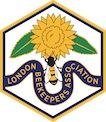
|
London Beekeepers' Association |

|
London Beekeepers' Association |
Nov in the Apiary[In the apiary, month by month.] Howard Nichols Even with the extended period of warm weather this year, November is still not an active month for the beekeeper. However, a certain amount of work still needs to be done. Final tidy up the apiary if not already done. Complete cleaning, sterilising and storing of equipment. Check stored supers for evidence of wax moth infestation. The lifecycle of the wax moth is substantially different to that of the honey bee. A wax moth egg is temperature dependent and is able to stay as an egg then hatch after a few weeks or months. Supers should be stored in a cold and draughty place if possible but also checked frequently during winter. If any evidence of wax moth is found the best way to deal with it is to place the frame(s) in a deep freeze cabinet for 48 hours. This will kill the wax moth in all 4 lifecycle stages. Planning for further varroa treatment in December. December is the usual month for treating the colony with Oxalic Acid. Monitoring natural mitedrop in November is a useful diagnostic tool and precursor to actual treatment next month. Insertion of the varroa floor for 1 week in November will give useful information to the beekeeper. Check the hive is secure and that the roof cannot blow off or be dislodged. Placing of heavy items such as a couple of housebricks on the roof is usually sufficient for a National with a well fitting flat roof. They are designed not to blow off. A hive with a gabled roof, such as a WBC, may need tethering with rope. The mouseguards should already be on the hive entrances. The colony should not now be opened until Spring except for the Oxalic Acid treatment in mid to late December. For those who have not yet taken the BBKA Basic Assessment, please download the syllabus from the BBKA website and consider background reading with a view to taking the assessment next summer. The requirement is that you have kept bees for a minimum period of 1 year. The LBKA will not pressurise anyone to take the assessment but will actively encourage and assist those wishing to do so. Reading about bees and beekeeping in the winter months is a useful way to spend our spare time and acts as a beekeeping bridge between the seasons. For those intending to take this assessment next Spring please contact me by email and I will supply you with electronic reading notes. Consider your approach to next season. Will you need an additional hive, nuc box or replacement frames? Most equipment suppliers have winter sales where they sell slight seconds. This is an excellent time to buy, especially if you search 2 or 3 websites for offers. If 2 or 3 people jointly purchase then you may even be able to save on the delivery charge. |
©2025 London Beekeepers' Association |